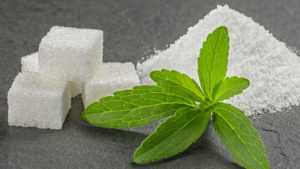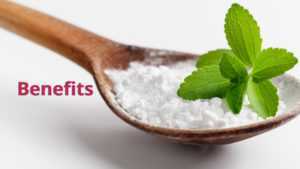Stevia is a plant that has scientific name Stevia rebaudiana, in the chrysanthemum family, which is a subgroup of the Asteraceae family (ragweed family). Stevia is the name given to over 240 species of shrubs and small flowering plants in the Asteraceae family, which includes sunflowers. The stevia leaves have been used as a sweetener in different teas and beverages for centuries in South America. To know the stevia benefits and side effects, this article is a must read for you!
The stevia in the product form available in the markets is made from the leaves of Stevia rebaudiana or Madhukari plant. The plant is native to South America (originally from Brazil and Paraguay). It functions as a sweetener and sugar substitute. Stevia is a tender perennial that prefers warm sun and dies back in cold weather.
Stevia Product Available in Market:
You can grow stevia plants at home and sweeten foods and beverages with the leaves. Extracts of the stevia leaf have been available as dietary supplements in the United States since the mid-1990s, and many of them contain a combination of sweet and unsweet components of the stevia leaf.


Stevia products sold in supermarkets, such as Truvia and Stevia, do not contain whole stevia leaves. They’re made from rebaudioside A, a highly refined stevia leaf extract (Reb-A). Reb-A sweeteners come in liquid, powder, and granulated varieties. And Reb-A has about 200 times the sweetness of table sugar.
Nutritional Value of Stevia:
Stevia plant is primarily valued for its sweet leaves and ability to replace sugar in the diet, but it also contains a plethora of antioxidant compounds, including flavonoids, triterpenes, tannins, caffeic acid, kaempferol, and quercetin.
Fiber, protein, iron, potassium, magnesium, sodium, vitamin A, and vitamin C are also found in the stevia plant. These additional elements, however, are almost non-existent in the sweetener form.
Stevia is a calorie-free sweetener. This means that it contains almost no calories. This aspect may be appealing if you’re trying to lose weight. The smaller organic compounds are responsible for the majority of stevia’s health benefits.
What is the Best Way to Use Stevia as a Sugar Substitute?
Stevia can be substituted for table sugar in a variety of foods and beverages. Stevia can be used in a variety of delicious ways, including; in coffee or tea, in homemade lemonade, on hot or cold cereal, a smoothie or on unsweetened yoghurt. A pinch of stevia powder is roughly equivalent to one teaspoon of table sugar.
According to FDA and other regulatory authorities, stevia is safe to be used in all the normal individuals, diabetics, pregnant women, kids, etc. Regulatory authorities have set the Acceptable Daily Intake (ADI) at 4 milligrams per kilogram (kg).
What Are Stevia Benefits And Side Effects?
In every drug and natural remedy, health benefits are accompanied by the side effects. Usually side effects are very minimum and ignorable, when the natural product is taken according to recommended dose. Same is the case with stevia. Stevia benefits and side effects for health should be considered before incorporating it as your daily diet ingredient.


Stevia Benefits:
Most people have discovered that stevia is an excellent sugar substitute due to its popularity as a natural sweetener. It is commonly used by diabetics or those on a sugar-free diet for other reasons. Here are the most common stevia benefits that you can get by incorporating it in your daily diet.
Stevia Benefits For Diabetics:
Stevia is a low-calorie sweetener with antioxidant and diabetes-fighting properties. The Food and Drug Administration of the United States has approved it (FDA). Unlike artificial sweeteners and sugar, stevia can lower plasma glucose levels while increasing glucose tolerance.
Stevia significantly reduced insulin and glucose levels in a 2010 study of 19 healthy, lean participants and 12 obese participants. Despite the lower calorie intake, it also left study participants satisfied and full after eating.
Stevia Benefits For Weight Loss:
Weight gain depends on multiple factors. Sometimes your hormones are playing with your metabolism or sometimes it is your poor eating habits. So if you want to cut down you calories to shed some extra pounds from your body, you can use stevia.
As it is calorie-free, it may aid in weight loss when used in place of regular sugar, which contains about 45 calories per tablespoon (12 grams). As a result, people can eat stevia-sweetened foods like cakes, cookies, and candies without worrying about gaining a lot of calories from sugars, which will not jeopardize their chances of successfully losing weight.
Stevia Benefits For Heart Health:
Stevia is reported to control bad cholesterol levels. In return it helps in preventing many heart conditions and benefits your circulatory system.
Stevioside is a type of glycoside, but there are other glycosides in stevia that can relax blood vessels, increase urination, and help the body eliminate sodium. Glycosides also lower the concentration of very low density lipoprotein (VLDL) and low density lipoprotein (LDL).
All these stevia benefits are helpful in protecting your heart from different diseases.


Stevia Benefits For Cancer:
Steiva’s anti-cancer properties are being studied by researchers. A glycoside found in stevia plants called stevioside, according to a 2012 study, helps boost cancer cell death in a human breast cancer line. Stevioside may also aid in the reduction of some mitochondrial pathways that promote cancer growth.
These findings were supported by a research in 2013. Many stevia glycoside derivatives were found to be toxic to leukemia, lung, stomach, and breast cancer cell lines.
Apart from the stevia sweeteners readily available in the market, the stevia extract from the plant also has many health benefits. For example;
Stevia Benefits For Oral Health:
Stevia has been shown to reduce the growth of bacteria in the mouth, making it a popular additive in toothpastes and mouthwashes. It also prevents cavities and gingivitis, which sucrose does not, thereby improving oral health.
Stevia Benefits For Bone Health:
Stevia is known to strengthen and protect the body against osteoporosis by promoting calcium absorption. As a result, bone mineral density, strength, and skeletal health improve. Although more research is needed in this regard, but the use of stevia leaf as a sweetener may help in promoting bone health.
Stevia Benefits For Kidneys:
Stevia is a diuretic, which means that it increases the rate at which the body excretes water and electrolytes in urine. Because the kidney is in charge of filtering and producing urine, researchers initially suspected that long-term stevia consumption would harm the organ. But this is not the case in reality.
Recent research, on the other hand, suggests that stevia may help prevent kidney damage. A laboratory study conducted in 2013 discovered that stevia reduced cyst growth in kidney cells.
Stevia Benefits For Skin:
Stevia has been found to be a useful topical application for skin conditions such as eczema and dermatitis due to its anti-bacterial properties. It prevents the spread of bacteria and acts as a steroid in these situations, making it ideal choice for many people who are unable to find relief from these problems.
Stevia has been shown in studies to prevent wrinkles, slow the signs of ageing, reduce acne, fight dermatitis or eczema, and revitalize the skin.
Read More About the Best Multi-vitamins For Hair, Skin and Nails Over Here
Stevia Side Effects:
Although the leaf extract from stevia plant is FDA approved and safe to be used but Stevia have some side effects.


Stevia Side Effects As Allergies:
Sugar alcohol is also present in some stevia products. Allergies to sugar alcohol can cause bloating, abdominal cramps, nausea, and diarrhea, though one type of sugar alcohol, erythritol, has a lower risk of causing symptoms than others.
Stevia Side Effects As Glucose Intolerance:
According to one study, nonnutritive sweeteners such as stevia may cause glucose intolerance and metabolic disorders.
Stevia Side Effects On Gut:
According to a new study, stevia may be harmful to gut health. Researchers discovered that, while stevia does not kill good bacteria in the gut, it can cause gut imbalance by preventing bacteria from communicating with one another in order to regulate the body’s functions.
Stevia Side Effects On Hormones:
Although the use of stevia is considered totally safe. But its long term and excessive use may cause some hormonal disturbance. Steviol glycosides, as a type of steroid, can interfere with hormones controlled by the endocrine system. A 2016 study discovered that human sperm cells exposed to steviol produced more progesterone.
Stevia Side Effects On Liver:
According to an animal study, the long term use of stevia can cause severe liver damage. But these studies are not confirmed in humans.
Who Should Avoid Stevia?
Stevia is FDA approved sugar substitute, but in some conditions, you should avoid it or try to take it with caution.
People having hypotension issues should take stevia with caution. As the sweetener can lower your blood pressure. Similarly, if you are on insulin and taking stevia, keep check on your blood sugar levels to avoid hypoglycemic attacks. If you are a chronic heart patient or have kidney disease, and taking medications, you should consume stevia with caution.
Stevia side effects may also enhance when you are on anti-cancer medications or hormonal therapy.
Conclusion:
Stevia is a natural sweetener that can be used daily. It helps in controlling your weight and blood sugar levels. It has a lot of health benefits that include, blood pressure management, skin health benefits, oral health, anti-cancer effects, etc. Although stevia is FDA approved, but it has some side effects, when taken in large amount or in chronic diseases.
It is important to consult your doctor before adding stevia in your daily diet. Your nutritionist can better guide you about the daily consumption of stevia, stevia benefits and side effects, etc. according to your weight, height and other health conditions.
Make an appointment right away to have all of your questions answered. You can book an appointment with the best nutritionists in Islamabad by calling the Marham helpline at 0311-1222398 or by using the online appointment booking facility on the website or the Marham mobile app.
| Android | IOS |
|---|---|
  |
  |
FAQs
Is it okay to have Stevia every day?
Yes, it is safe to use stevia every day. The FDA recommends a daily intake of 4 milligrams (mg) per kilograms of body weight for steviol equivalents. This translates to approximately 12 mg of high-purity stevia extracts per kilogram of body weight per day.
Is stevia better for you than sugar?
Yes stevia is better than refined sugar. Stevia contains fewer calories than sugar and may aid in weight management by allowing you to consume fewer calories. It’s a great sugar substitute for people on low-calorie or low-carb diets because it’s free of calories and carbs.
Does stevia cause kidney damage?
If you consume stevia more than the daily recommended amount, you may face liver and kidney inflammation and consequently organ damage. According to an animal study, stevia can cause liver and kidney damage when consumed in large amount.
Is stevia safe to consume?
Stevia is FDA approved sugar substitute and safe to consume when taken according to recommended daily amount. The stevia plant extract is more natural and safer to be used for maximum health benefits.
Is stevia natural or artificial?
Unlike other sugar substitutes, stevia is natural. It is made of a leaf related to popular garden flowers such as chrysanthemums from the Ragweed family. For many years, people in South America and Asia have used stevia leaves to sweeten beverages such as tea.

